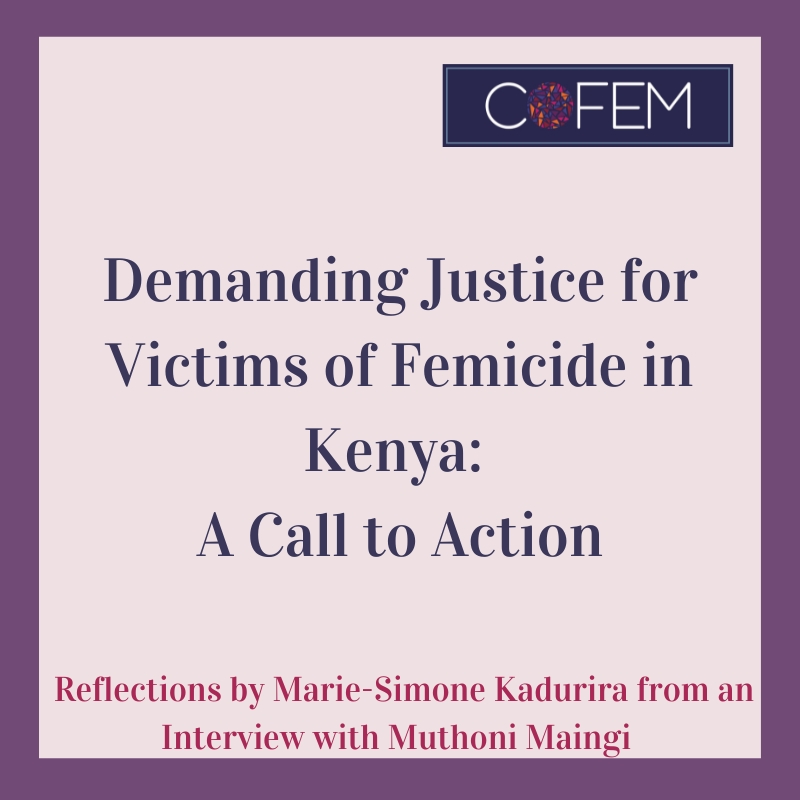This blog captures the reflections and provocations shared by Muthoni Maingi, a prominent feminist activist and co-founder of a grassroots organisation combating gender-based violence in Kenya. In a compelling dialogue with Marie-Simone Kadurira (COFEM East & Southern Africa Regional Liaison), Muthoni delves into the motivations, challenges, and aspirations driving the #TotalShutdown-Again March Against Femicide in Kenya, which took place in January 2024. Through insightful anecdotes and poignant analysis, this conversation sheds light on the urgency of addressing femicide and advancing gender equality in Kenya and beyond.
As an interviewer, delving into the depths of the femicide crisis in Kenya was both enlightening and deeply sobering. In conversation with Muthoni Maingi, a tireless advocate for gender equality and justice, the gravity of the situation became palpable. We discussed the roots of the crisis, the resilience of the movement, and the urgent need for change.
The interview unveiled a stark reality: femicide is not a recent phenomenon in Kenya. It has deep roots, fueled by broken promises and systemic failures. Despite pledges from the government, justice remains elusive for far too many families who have lost loved ones to gendered violence.
Maingi illuminated the insidious role of media sensationalism and online scapegoating in perpetuating a culture where violence against women thrives. The normalization of such behaviour not only desensitises society but also exacerbates the trauma experienced by victims’ families. It’s a vicious cycle that demands our attention and action.
Yet, amidst the despair, there is hope. The recent uprising in Kenya, spearheaded by a diverse coalition of activists, marks a turning point in the fight against femicide. What sets this movement apart is its inclusivity – it transcends barriers of gender, sexuality, and socio-economic status, uniting individuals under a common cause: justice.
The movement’s strategy is as strategic as it is powerful. By organizing marches, vigils, and leveraging social media platforms, activists have ignited a nationwide conversation, forcing policymakers to confront the uncomfortable truths about gender-based violence. Their demands are clear: femicide must be recognized as a national emergency, and concrete steps must be taken to address it.
The movement’s roots run deep, intertwining with the fabric of Kenyan society. It is a response to years of neglect, a cry for justice that reverberates through the streets and resonates in the hearts of those who refuse to be silenced. As Maingi articulated, this is not just about seeking justice for the victims of femicide; it is about dismantling the structures of oppression that enable such violence to flourish.
At its core, the movement is a testament to the power of collective action. It is a reminder that change is not a solitary endeavour but a collaborative effort fueled by the voices of those marginalised by systems of oppression. It is a call to arms for all who believe in the inherent dignity and worth of every human being, regardless of gender, race, or social status.
But the journey ahead is fraught with challenges. The online realm, as Maingi highlighted, has become a battleground for misogyny and violence. Yet, even in the face of such adversity, the movement persists, fueled by the unwavering determination of its members.
What struck me most about the interview was the resilience of those involved in the movement. Despite the trauma and exhaustion, activists continue to push forward, buoyed by a sense of purpose and solidarity. Their commitment to self-care and mental health is a testament to their strength and humanity.
As I reflect on the interview with Maingi, I am reminded of the words of Audre Lorde: “Revolution is not a one-time event.” The fight against femicide is ongoing, requiring sustained efforts, collective action, and unwavering determination. But in the darkness, there is light – the light of hope, of resilience, of a better future.
The work of feminist organizers is crucial, monumental, and transformative. But it is often poorly funded and supported. On the surface, this creates challenges for the immediate issues at hand, but when we look deeper, we also realize that this lack of support siloes gendered violence, leading to cycles of progress and setbacks. The recent floods in Kenya serve as a poignant example of this. In the midst of climate crises, women and girls are increasingly vulnerable, especially to violence. Yet, community-grounded feminist organizers either receive minimal support or face single-issue support that fails to address the interconnectedness of climate and gender issues.
Climate crises and Gender-Based Violence (GBV) are intricately linked, and support as well as funding needs to reflect that. While we can applaud feminist organizers for the work that they do, it ceases to be enough. We must also call for better support structures that ensure women and non-binary folks’ work is empowered and not stifled due to siloed approaches.
Our commitment to justice must remain unwavering. We are called to hold our leaders accountable, demand action, and refuse complicity in perpetuating violence. Only through our collective efforts can we envision a world free of femicide, rather than a haunting headline.
The time for change is now. Let us seize it together.
